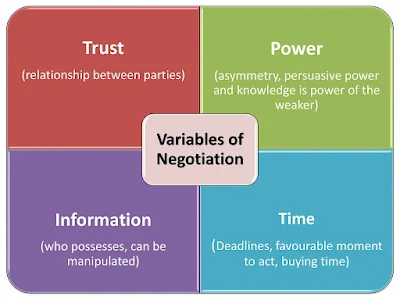Information ( Part 2 ) - 3 Crucial Variables
Dear Reader's, We are discussing The 3rd and Final Part of the Variable "Information".
So, Let's Continue discussing where we have left from last time, discussed about the Non-Threatening Approach.
In many years of Negotiation, Again and Again people have told me rewarding things. Let me Give you an Example for you to understand easily, One Summer I had a job in sales, and I remember a foreman's mentioning in an Informal Conversation,
"Your Product is the only one that passed Our Tests and meets Our Specifications," and
"Hey, Cohen! When do you think we'll conclude next month's Negotiation? We're running out of Inventory!"
Obviously I tucked all this Information away and then Remembered it when face to face during the Actual Negotiating with the Purchasing Manager.
Realistically, it may not always be possible for you to make this direct contact with the other side's associates. On these occasions you can make use of third parties, use the telephone, or speak with people who have Negotiated with them in the Past. Everyone has a Track Record, and you can learn from the experience of others.
Another source of data is your adversary's competitors, who may well be willing to talk to you about costs. If you, as a buyer, can gain access to the seller's costs, you will have a tremendous bargaining advantage.
This Information is not as difficult to obtain as you might think, since many publications, both Private ( for example the automobile Blue Book ) and governmental, furnish all sorts of data upon request.
Remember, what you want to know going into the Negotiation Event is the Real Limits on the other side, that is, the extent beyond which they will not go. The more Information you have about their Financial Situation, Priorities, Deadlines, Costs, Real Needs, and Organizational Pressures, the better you can Bargain.
And the sooner you start to acquire these data, the easier they will be to obtain.
In most Instances, there's more to gathering Information than playing Humble and saying, "Help Me". Generally you have to give Information in order to get some in return. You gradually give selective Information for 3 Reasons:
- According to the Religions, It's more Blessed to Give than to Receive.
- Perceptive people won't communicate with you beyond the chit-chat level until reciprocal risks take place. they won't share Information with you until you share some commensurate Information with them. To persuade someone to advance to another square, you have to advance to another square, seemingly on an even-Steven basis with their Revelations. This is mutual Risk-Taking Behavior- the deliberate building of 2 way Trust.
- When you give carefully worded and controlled Information during the "Process Stage", you hope to lower the expectation level of the other side.
This 3rd Point is especially Important because if you spring something completely new during the event, the response you receive will be, "No way- I never heard of that."
If your surprise is close to the deadline you have a strong chance of deadlocking the Negotiation.
However, if you were to Introduce the same New Concept early during the "Process Stage", then raise it several more times, at adroitly spaced intervals, the concept would become familiar to the other side.
If this matters were now bought up during the event, the response might well be, "Oh, that-it's been around for a while." In essence it takes some time to get used to any new Idea. Because it's now familiar, it's somehow acceptable.
Don't be surprised, therefore, when you receive the Initial Rejection to your New Request prior to the event. "No" is a reaction, not a Position.
The People who React Negatively to your Proposal simply need Time to Evaluate it and adjust their thinking. With the passage of sufficient Time and Repeated Efforts on your Part, almost every "No" can be transformed into "May Be" and eventually a "Yes".
If you allow a sufficient period for Acceptance Time and can Furnish them with the new Information that they have not considered in formulating their Initial "No", you can win them over.
Well, Readers we will continue to discuss about this Topic further in Next Part.
Do not Foget to Follow Our Website for Future Updates.


Post a Comment